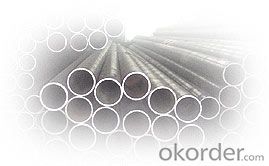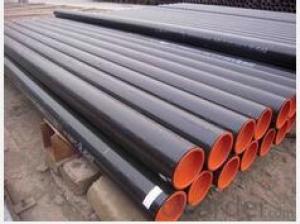Seamless steel tubes for petroleum cracking
- Loading Port:
- China Main Port
- Payment Terms:
- TT OR LC
- Min Order Qty:
- -
- Supply Capability:
- -
OKorder Service Pledge
OKorder Financial Service
You Might Also Like
Seamless steel tubes for petroleum cracking
Standard:
GB9948 Chinese national standard
Application:
Served as for furnace tubes,heat exchange tubes and pipelines in petroleum and refinery plants
Model No.of major steel tubes:
1n 9n 1Er!rMn 1rhMn 1f:hM0 etC
Diamensional tolerances:
Types of steel tubes | Outer diameter | Wall thickness | ||
Cold-rolled tubes | Tube sizes(mm) | Tolerances(mm) | Tube sizes (mm) | Tolerances(mm) |
>30~50 | ±0.3 | ≤30 | ±10% | |
>50~219 | ±0.8% | |||
Hot-rolled tubes | >219 | ±1.0% | >20 | ±10% |
Mechanical properties:
Standard codes | Models of steel tubes | 抗拉强度(MPa) | 屈服强度(MPa) | 伸长率(%) | 冲击功(J) | 布氏硬度(HB) | 交货状态 |
GB9948 | 10 | 330~490 | ≥205 | ≥24 | / | / | 正火 |
20 | 410~550 | ≥245 | ≥21 | ≥39 | / | 正火 | |
15CrMo | 440~640 | ≥235 | ≥21 | ≥47 | ≤170 | 正火加回火 | |
1Cr2Mo | ≥390 | ≥175 | ≥22 | ≥92 | ≤179 | 正火加回火 | |
1Cr5Mo | ≥390 | ≥195 | ≥22 | ≥92 | ≤187 | 退火 |
Chemical composition:
Standard codes | Models of steel tubes | Chemical compositions(%) | |||||||
C | Si | Mn | P | S | Cr | Mo | Ni | ||
GB9948 | 10 | 0.07~0.14 | 0.17~0.37 | 0.35~0.65 | ≤0.035 | ≤0.035 | ≤0.15 | / | ≤0.25 |
20 | 0.17~0.24 | 0.17~0.37 | 0.35~0.65 | ≤0.035 | ≤0.035 | ≤0.25 | / | ≤0.25 | |
15CrMo | 0.12~0.18 | 0.17~0.37 | 0.40~0.70 | ≤0.035 | ≤0.035 | 0.80~1.10 | 0.40~0.55 | ≤0.30 | |
1Cr2Mo | ≤0.15 | 0.50~1.00 | 0.30~0.60 | ≤0.035 | ≤0.030 | 2.15~2.85 | 0.45~0.65 | / | |
1Cr5Mo | ≤0.15 | ≤0.50 | ≤0.60 | ≤0.035 | ≤0.030 | 4.00~6.00 | 0.45~0.60 | ≤0.60 | |
- Q:How to distinguish between steel pipe and spiral pipe material?
- Steel pipe according to the pipe material (ie steel) can be divided into: carbon tube and alloy tube, stainless steel tube.Carbon tube can be divided into ordinary carbon steel tube and high quality carbon structure tube.
- Q:What is the size of seamless steel tube DN150?
- Seamless steel pipe having a hollow cross section, used as a conduit for conveying fluids, such as pipelines for transporting petroleum, natural gas, gas, water, and certain solid materials. Compared withsteel and roundsteelinsolid, flexural torsional strength in the same time, the weight is light, is a kind of economic section steel, widely used in the manufacture of structural parts and mechanical parts, such as the oil pipe, automobile transmission shaft, the bicycle frame and steel construction with scaffold with steel pipe manufacturing ring parts can be improved the utilization rate of materials, simplify the manufacturing process, material saving and working hours, has been widely used to manufacture steel tube.
- Q:Can steel pipes be used for underground fuel pipelines?
- Yes, steel pipes can be used for underground fuel pipelines. Steel pipes are commonly used for various types of pipelines due to their durability, strength, and resistance to corrosion. When it comes to underground fuel pipelines, steel pipes are a popular choice due to their ability to withstand high pressure and temperature fluctuations. Additionally, steel pipes provide excellent protection against external elements, such as soil movement or chemical reactions, ensuring the safety and integrity of the fuel transportation system. Proper insulation and coating can further enhance the corrosion resistance of steel pipes, making them a reliable option for underground fuel pipelines.
- Q:What are the advantages of using steel pipes in irrigation systems?
- There are several advantages to using steel pipes in irrigation systems. Firstly, steel pipes are highly durable and resistant to corrosion, providing a longer lifespan compared to other materials. This ensures the longevity and reliability of the irrigation system. Additionally, steel pipes have a high tensile strength, allowing them to withstand high pressure and heavy loads, making them suitable for various irrigation applications. Moreover, steel pipes have a smooth interior surface, minimizing friction and allowing for efficient water flow, which is crucial for irrigation efficiency. Lastly, steel pipes are recyclable, making them an environmentally friendly choice for irrigation systems.
- Q:Are steel pipes recyclable?
- Yes, steel pipes are recyclable.
- Q:What are the different sizes available for steel pipes?
- Steel pipes are available in a wide range of sizes, including standard sizes such as ½ inch, 1 inch, 2 inches, and up to larger sizes like 24 inches and beyond. The specific sizes available depend on the manufacturer and the intended application of the steel pipes.
- Q:Are steel pipes suitable for offshore drilling platforms?
- Yes, steel pipes are suitable for offshore drilling platforms. Steel pipes are known for their high strength, durability, and resistance to corrosion, making them ideal for withstanding the harsh and corrosive marine environment. Additionally, steel pipes have excellent load-bearing capacity and can handle the high pressure and extreme conditions associated with offshore drilling operations.
- Q:What are the common sizes of steel pipes available?
- The common sizes of steel pipes available vary depending on the specific industry or application. However, there are several standard sizes that are commonly used across different industries. These sizes are typically referred to by their nominal pipe size (NPS) or their outside diameter (OD). Some of the most common sizes of steel pipes include 1/8 inch, ¼ inch, ½ inch, ¾ inch, 1 inch, 1 ¼ inch, 1 ½ inch, 2 inch, 2 ½ inch, 3 inch, 3 ½ inch, 4 inch, 5 inch, 6 inch, 8 inch, 10 inch, 12 inch, 14 inch, 16 inch, 18 inch, 20 inch, 24 inch, 26 inch, 30 inch, 36 inch, 42 inch, 48 inch, and 54 inch. These sizes are commonly used in various applications such as plumbing, construction, oil and gas pipelines, structural supports, and industrial processes. It is important to note that these sizes may vary slightly depending on the specific industry standards or requirements. Additionally, steel pipes are available in different wall thicknesses, which are commonly referred to as schedules. The most common schedules include schedule 40, schedule 80, schedule 160, and schedule XXS (extra extra strong). The schedule number indicates the wall thickness of the pipe, with higher numbers indicating thicker walls. In conclusion, the common sizes of steel pipes available range from 1/8 inch to 54 inches in diameter. These sizes are commonly used across various industries and applications, and they can vary in wall thickness based on the specific schedule.
- Q:How are steel pipes used in the manufacturing of boilers and heat exchangers?
- Steel pipes are an essential component in the manufacturing of boilers and heat exchangers due to their unique properties and capabilities. These pipes are specifically designed to withstand high temperatures, pressures, and corrosive environments, making them ideal for these applications. In the manufacturing process of boilers, steel pipes are used to construct the main body or shell of the boiler. This shell contains the water or steam that is heated to generate heat or produce steam for various industrial processes. The steel pipes used in boilers are typically seamless or welded, with precise dimensions and high strength to ensure structural integrity and prevent leaks. Heat exchangers, on the other hand, are devices used to transfer heat between two fluids, often with different temperatures. Steel pipes are employed in heat exchangers as the primary medium for transferring heat. The pipes are usually arranged in a pattern, allowing the hot fluid to pass through one set of pipes while the cold fluid passes through another set. This arrangement enables efficient heat transfer between the two fluids. The use of steel pipes in boilers and heat exchangers offers several advantages. Firstly, steel pipes have excellent thermal conductivity, allowing for efficient heat transfer between the fluid and the surrounding environment. Secondly, steel pipes have high tensile strength and can withstand high pressure, ensuring the safety and reliability of the equipment. Thirdly, steel pipes are resistant to corrosion, which is crucial in environments where the fluids being processed are corrosive or contain impurities. Moreover, steel pipes can be easily fabricated and customized to meet the specific requirements of boilers and heat exchangers. They can be manufactured in various sizes, lengths, and thicknesses to accommodate different applications. Additionally, steel pipes can be coated or lined with materials such as ceramic or epoxy to provide further protection against corrosion or abrasion. In summary, steel pipes play a vital role in the manufacturing of boilers and heat exchangers. Their unique properties, including high strength, thermal conductivity, and corrosion resistance, make them the ideal choice for these applications. The use of steel pipes ensures the efficient operation, safety, and longevity of boilers and heat exchangers in various industrial processes.
- Q:What are the different types of joints used in steel pipes?
- The different types of joints used in steel pipes include butt weld, socket weld, threaded, and flanged joints.
1. Manufacturer Overview |
|
|---|---|
| Location | |
| Year Established | |
| Annual Output Value | |
| Main Markets | |
| Company Certifications | |
2. Manufacturer Certificates |
|
|---|---|
| a) Certification Name | |
| Range | |
| Reference | |
| Validity Period | |
3. Manufacturer Capability |
|
|---|---|
| a)Trade Capacity | |
| Nearest Port | |
| Export Percentage | |
| No.of Employees in Trade Department | |
| Language Spoken: | |
| b)Factory Information | |
| Factory Size: | |
| No. of Production Lines | |
| Contract Manufacturing | |
| Product Price Range | |
Send your message to us
Seamless steel tubes for petroleum cracking
- Loading Port:
- China Main Port
- Payment Terms:
- TT OR LC
- Min Order Qty:
- -
- Supply Capability:
- -
OKorder Service Pledge
OKorder Financial Service
Similar products
New products
Hot products
Related keywords





























